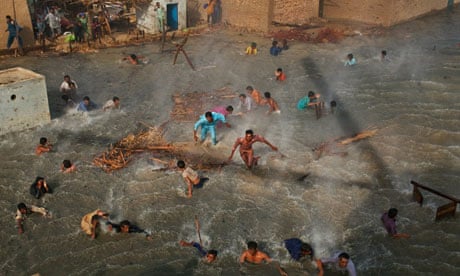Pakistan has been hit by the worst floods in its history. An estimated 2,000 people have died so far with close to 1m homes badly damaged or destroyed. The United Nations estimates more than 20 million people are suffering, with over 160,000 sq km affected as a result of the flooding – exceeding the combined total affected by the 2004 Indian Ocean tsunami, the 2005 Kashmir earthquake and the 2010 Haiti earthquake.
The main flood areas are southern Punjab, interior Sindh and the northwestern province of Khyber-Pakhtunkhwa. Two of these – Khyber-Pakhtunkhwa and southern Punjab – are believed to be regional hubs of Islamic militancy.
So far, neither the military nor the government has proven motivated or capable enough to ameliorate the situation. Foreign aid is slow and grossly inadequate. The geographical location of the areas and the presence of militants discourage both foreign and local donor agencies from sending ground teams. The lack of foreign and domestic aid is also being attributed to the credibility deficit of the inefficient and notoriously corrupt government.
Together, these factors have created a vacuum in relief efforts, which can have potentially disastrous consequences in areas where fundamentalist parties and militant groups have strong grassroots organisational structures.
The presence of these groups allowed them the fastest reaction time when calamity struck. Jamaat-ud-Dawa, the alleged humanitarian wing of Lashkar-e-Taiba (responsible for the Mumbai terror attacks) is out helping flood victims in southern Punjab. The Al-Khidmat Foundation, the welfare wing of the Jamaat-e-Islami, Pakistan's largest and most influential rightwing religious party, claims to have mobilised 16,500 volunteers and provided food and medical care to tens of thousands of people all over the country. Another organisation, the Al-Rasheed Trust, which is banned by the US for helping the Taliban, has been very active in Khyber-Pakhtunkhwa.
The relief camps are often set in mosques and madrasas where the local imam is entrusted with disbursing aid. The presence of mosques and imams in every town provides the opportunity of an organised relief effort. The posters outside the relief camps and the messages on the food items are often Islamic, anti-government and anti-US. Many madrasas in southern Punjab fill the void created by the destruction of most public schools, while providing free religious education. The religious groups like the Al-Khidmat Foundation are increasingly recruiting volunteers from the flood-affected areas.
The authorities' abysmal performance is strengthening the Islamic extremist view that the government is corrupt, incompetent and hopelessly dependent on unreliable foreign allies. Many of these criticisms of the government are justified, but excuses cannot be made to allow the militants to regroup – and to win public support.
There are hundreds of thousands of young, impressionable and deeply vulnerable people in the flood-affected areas right now. Since the earliest response in many areas was from the religious organisations and militant groups, victims are beginning to reconsider their views of them.
These groups are being so efficient, as for now they are acting as religious charities. They are winning the hearts and minds of people who feel abandoned by all other sources. I do not expect those affected by the floods to discriminate between sources of aid: in the flood areas it is a Hobbesian world where the self-preservation instinct prevails over everything else.
I am not implying that militant idealogy is being overtly disseminated in the flood-affected areas yet, but that the calamity has provided a huge public relations opportunity for the militants. It is imperative that the world realises that it could undo a lot of what the global "war on terror" has achieved.
The international community needs to grasp that this is not Pakistan's problem alone. The Pakistani government and the world need to act immediately, not on a military level but rather by outperforming the militant and religious groups in relief and rehabilitation. Huge financial resources are required; equally significantly, presence on the ground is required. The people affected need the reassurance that the world (and not only religious groups) cares for them.
